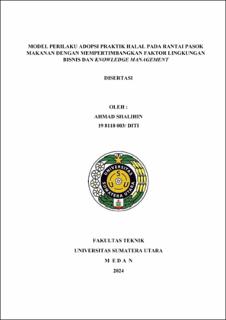Model Perilaku Adopsi Praktik Halal pada Rantai Pasok Makanan dengan Mempertimbangkan Faktor Lingkungan Bisnis & Knowledge Management
Behavioral Model of Adoption of Halal Practices in the Food Supply Chain by Considering Business Environmental Factors and Knowledge Management

Date
2024Author
Shalihin, Ahmad
Advisor(s)
Nasution, Harmein
Hidayati, Juliza
Vanany, Iwan
Metadata
Show full item recordAbstract
The halal industry has experienced significant growth and spread to various countries, especially in the food and beverage industry. Halal Supply chain management must comply with halal law in terms of material (dzatihi) and actions (lighairi dzatihi). This study aims to determine the role of individual factors (intention, attitude, subjective norms, and perceived behavioral control) and organizational factors (Knowledge Management and support from the business environment) on the behavior of adopting halal practices and to develop a measurement model for the behavior of adopting halal practices in the halal supply chain. This study combines quantitative and qualitative approaches to analyze the factors that influence the behavior of adopting halal practices in the halal supply chain, focusing on food and beverage manufacturers. Using Structural Equation Modeling (SEM), this study examines how individual factors (attitude, subjective norms, and perceived behavioral control) and organizational factors (Knowledge Management and support from the business environment) influence the intention and behavior of adopting halal practices. In addition, qualitative analysis was conducted to dig deeper into the experiences, challenges, and views of manufacturers in implementing halal practices. Quantitative data were collected through a survey of 150 halal-certified food and beverage manufacturers using a Likert scale, while qualitative data were obtained through in-Depth Interviews with 7 key informants in the halal food industry. The results of the quantitative analysis showed that attitudes, subjective norms, and perceived behavioral control significantly influenced the intention to adopt halal practices. On the organizational side, Knowledge Management, including knowledge sharing and knowledge accessibility, as well as support from the business environment, such as government support and halal authorities, played an important role in strengthening halal adoption. From the results of qualitative Interviews, it was found that the main challenges in adopting halal practices include access to technology that supports halal certification and limited human resources who understand halal standards. In addition, the existence of clear management support and government regulations are driving factors in the implementation of halal practices. The combination of material, information, and money flows in the halal supply chain has also proven to be a crucial aspect in the successful implementation of halal standards/principles. This study contributes to the factors that drive the behavior of adopting halal practices, as well as offering practical recommendations for policy makers and organizational management to strengthen support in the halal supply chain. needed in the implementation of halal standards in the supply chain.
